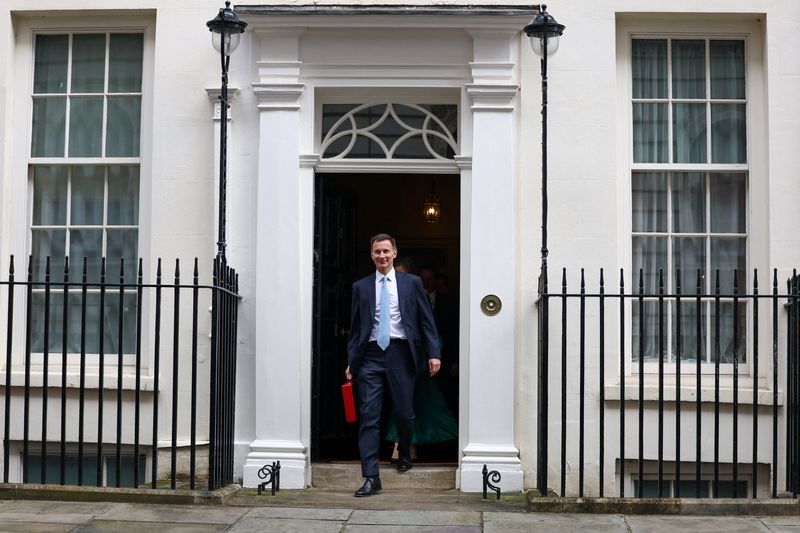By Naomi Rovnick and Harry Robertson
LONDON (Reuters) - Investors in UK assets reaffirmed a view that the economy was heading for interest rate cuts in the coming months as finance minister Jeremy Hunt resisted budget giveaways on Wednesday that could have sparked fears of inflationary over-spending.
Hunt trimmed national insurance contributions by 2 pence in the pound but stuck to a fiscally cautious mandate that eased anxiety about Britain's $3 trillion debt burden, boosted consumer stocks and helped the pound stay robust against major peers.
Since September 2022, UK budgets have unsettled investors scarred by the mayhem unleashed by former prime minister Liz Truss' underfunded tax and spending plans.
"It is seemingly still taking some time to rebuild that trust," added Dean Turner, an economist at UBS. "But I think this government and this chancellor have definitely learned that going down the Liz Truss route is not for them."
Hunt was under pressure to cut taxes more deeply ahead of a national election and with his Conservative Party trailing the opposition Labour Party by a wide margin, investors had feared a budget that undermined the BoE's battle against inflation.
"There was a temptation to deliver 3 or even 4 pence cuts on NI and ... the risk to inflation would have been higher," said Schroders (LON:SDR) senior European economist Azad Zangana, noting that both overseas and UK investors had been nervous ahead of the budget.
Sterling held near Tuesday's one-month highs against the dollar and London's FTSE stock index slightly outpaced its European peers.
In Britain's government bond market, which affects the cost of borrowing for corporates and mortgages and was at the centre of the 2022's post-mini budget rout, 10-year gilt yields touched their lowest in almost three weeks. That move also came as Federal Reserve chief Jerome Powell testified to Congress.
GILT MARKETS
With the UK's high debt burden and future borrowing needs already priced in, there was now scope for the gilt market to rebound, investors said.
"The feelings towards the UK were quite negative, so there was some meaningful underweight and that has been basically flattened out," said Ales Koutny, head of international rates at Vanguard, which manages $8.6 trillion in funds.
"We take the view that we do see rate cuts coming through which should feed into a better performance for gilts," said Janus Henderson fund manager Stephen Payne.
The 10-year gilt yield, which moves in the opposite direction to the price of the debt instrument, has underperformed global peers. It was last trading at 4.0%. It is up 50 basis points so far this year, versus a 25 bps and 30 bps increase in U.S. and German peers respectively.
Payne said Hunt was sticking with the need for financial stability and so staying within fiscal rules.
"This just reinforces the view that budget risk has faded,” for UK markets," he added.
Moody's ratings agency said Wednesday's budget would "perpetuate the UK's fiscal challenges" - but it added that the government's commitment to meeting its fiscal rules would help to underpin Britain's stable Aa3 rating.
The BoE has lifted borrowing costs to a 16-year high of 5.25% but traders are betting on roughly 65 basis points worth of future rate cuts, with the first fully priced in for August -- likely after the euro zone and U.S. central banks have moved.
Schroders' Zangana said the BoE could potentially cut as early as May.
Hunt forecast Britain's economy would grow by 0.8% this year, coming out of a technical recession.
This was a touch stronger than a forecast for an expansion of 0.7% in the previous outlook for 2024.
Sterling has been one of the best-performing major currencies against the dollar in the last year, with a 7% gain, partly because BoE rate cuts are expected to lag other central banks.
It was trading at around $1.27 on Wednesday - not far off one-month highs hit a day earlier
Consumer-focused UK stocks also performed well on Wednesday, with pub group Mitchells & Butler and fast food chain Greggs (LON:GRG) gaining more than 3%.
UK financial services businesses including fund manager Jupiter and stockbroker AJ Bell were also boosted by Hunt's pledge to drive more investment into the nation's moribund equity markets. The domestically focused FTSE 250 rose 1.4%, outperforming other major stock markets.

"People are putting two and two together and coming up with the idea that a tax (NI) cut equals more consumer spending," UBS' Turner said.
(This story has been corrected to fix the spelling of Vanguard's Koutny in paragraph 10)